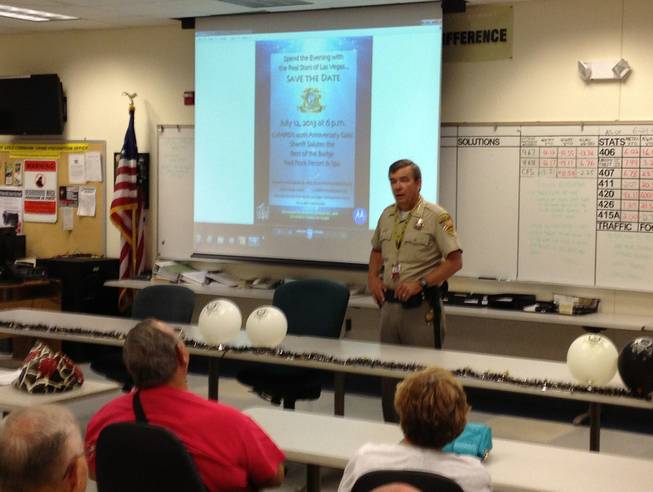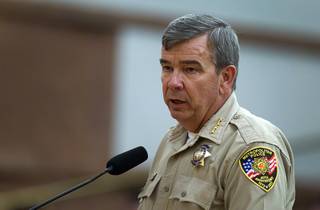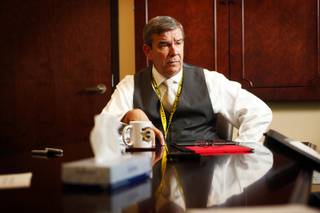
Metro Police Sheriff Doug Gillespie talks about the department’s history during Metro Police’s First Tuesday at the Northwest Area Command on Tuesday, July 2, 2013. Metro Police celebrated its 40th anniversary on Monday.
Wednesday, July 3, 2013 | 2 a.m.
Sheriff Doug Gillespie remembers a time when there were two factions of cops within the Metro Police Department — city officers and county officers.
At that time more than 30 years ago, the Las Vegas Police Department and the Clark County Sheriff’s Department were about seven years into a merger. Even then, officers from both sides would argue during briefings, and remained skeptical that combining into one entity was a good idea.
Yet the department stayed on the path Sheriff Ralph Lamb and Police Chief John Moran envisioned in 1973 when they decided to combine to form Metro Police.
On July 1, that vision — the Metro Police Department — turned 40 years old. Gillespie and veteran retired patrol officer Ray Berni reflected on that history during a nostalgia-filled First Tuesday event at the Northwest Area Command office.
“We’ve been in existence for 40 years, and the Metropolitan Police Department has withstood the test of time,” Gillespie said. “When you think back to what the founders … envisioned this organization being and becoming, we’ve done that and more.”
Dozens of residents gathered for the monthly citizen’s meeting that focused on the department’s 40th anniversary. They watched a video that flashed photos of the officers who gave their lives to the job, and saw clips of the different sheriffs who have led Metro to its current position.
Both Gillespie and Berni then reflected on the evolution they’ve seen the department and job make since they joined the force more than 30 years ago.
Back then, patrol officers used maps and memorized block numbers to navigate the city, and wrote their reports on carbon paper. They didn’t have phones, and they certainly didn’t have laptops in their patrol cars. Training was different, too. The officer’s manual was thin, and there was plenty of yelling.
Today, the department and job of the officer has evolved. With an increase in technology and weapons, officers are required to do a lot of multitasking. Yet their roles have also become more specialized.
Meanwhile, the police department has expanded from three to eight substations to reflect the growth of the county, and training includes thicker manuals and less yelling.
“Today’s police officers are not better or worse, they’re just different,” Berni said. “When I came on … you had been a psychologist, a marriage, counselor, a cop — now we’re more specialized. Now there’s much more training than we ever got, which is a good thing because you need to adapt to your surroundings.”
Yet, as much as the department has changed, the core principles of the job and the department have remained. Every officer is introduced to the teachings of a man named Sir Robert Peel, who created Metropolitan Police in 1829 England, and believed police and community must work together.
Meanwhile, the amount of responsibility an officer takes on when they put on the uniform also remains the same.
“As police, we can take people’s freedoms and take their lives, but with it, comes ultimate responsibility,” Berni said. “We try and teach the new guys that.”
Gillespie thinks back on his time in the department with memories of inspiration and enjoyment, but also memories of tragedy that come with the job.
A lot has changed since he entered the force. There is only one faction of police officers now — a Metro Police officer. As time marches on, Metro continues to evolve and uphold the vision Moran and Lamb set 40 years ago.
“Where we were and what we had when I was hired on 30 years ago, I’m amazed,” Gillespie said. “I came here for the job and never would’ve envisioned that the Metropolitan Police Department or myself would’ve grown to what it has.”



Join the Discussion:
Check this out for a full explanation of our conversion to the LiveFyre commenting system and instructions on how to sign up for an account.
Full comments policy